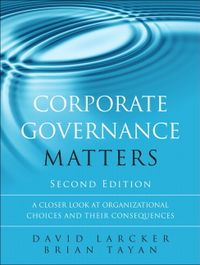
Corporate Governance Matters Upplaga 2
The Most Authoritative, Objective Guide to Designing Effective Corporate Governance
Now fully updated for the latest research, trends, and regulations, Corporate Governance Matters, Second Edition, offers comprehensive and objective information for everyone seeking to improve corporate governance--from directors to institutional investors to policymakers and researchers.
David Larcker and Brian Tayan thoroughly examine the choices now available in designing governance systems, explaining what is known about their impact on organizational performance. Avoiding ideology, Larcker and Tayan take an empirical approach that presents conclusions only where evidence supports them, and candidly identifies areas where broad conclusions cannot be drawn.
This edition adds new coverage of the governance implications of private equity, hedge funds, sovereign wealth funds, shareholder activists, engaged institutional investors, proxy advisory firms, new rating systems, and emerging benefit (B) corporations. Larcker and Tayan review new research on selecting board members and organizing their work, utilizing equity incentives and clawbacks, assessing CEO risk-seeking behavior, and much more. They have also added a new chapter on alternative governance structures, including family-operated and venture-backed companies.
This guide thoroughly addresses key issues ranging from strategic oversight and risk management to succession planning. Thoughtful and measured throughout, it is indispensable for every governance practitioner.
Optimizing overall board effectiveness
Managing board duties, liability, selection, compensation, removal, and structure
Strategy, performance measurement, and risk management
Strengthening oversight of strategy development and execution
Supervising executive compensation
Attracting and retaining the right people, and giving them the right incentives
Ensuring effective reporting and control
Maximizing the effectiveness of audit committees and external auditors
Additional resources and supporting material for this book are available at:
Stanford Graduate School of Business
The Corporate Governance Research Initiative
www.gsb.stanford.edu/cgri-research
Upplaga: 2a upplagan
Utgiven: 2015
ISBN: 9780134031569
Förlag: Pearson FT Press
Format: Inbunden
Språk: Engelska
Sidor: 464 st
The Most Authoritative, Objective Guide to Designing Effective Corporate Governance
Now fully updated for the latest research, trends, and regulations, Corporate Governance Matters, Second Edition, offers comprehensive and objective information for everyone seeking to improve corporate governance--from directors to institutional investors to policymakers and researchers.
David Larcker and Brian Tayan thoroughly examine the choices now available in designing governance systems, explaining what is known about their impact on organizational performance. Avoiding ideology, Larcker and Tayan take an empirical approach that presents conclusions only where evidence supports them, and candidly identifies areas where broad conclusions cannot be drawn.
This edition adds new coverage of the governance implications of private equity, hedge funds, sovereign wealth funds, shareholder activists, engaged institutional investors, proxy advisory firms, new rating systems, and emerging benefit (B) corporations. Larcker and Tayan review new research on selecting board members and organizing their work, utilizing equity incentives and clawbacks, assessing CEO risk-seeking behavior, and much more. They have also added a new chapter on alternative governance structures, including family-operated and venture-backed companies.
This guide thoroughly addresses key issues ranging from strategic oversight and risk management to succession planning. Thoughtful and measured throughout, it is indispensable for every governance practitioner.
Optimizing overall board effectiveness
Managing board duties, liability, selection, compensation, removal, and structure
Strategy, performance measurement, and risk management
Strengthening oversight of strategy development and execution
Supervising executive compensation
Attracting and retaining the right people, and giving them the right incentives
Ensuring effective reporting and control
Maximizing the effectiveness of audit committees and external auditors
Additional resources and supporting material for this book are available at:
Stanford Graduate School of Business
The Corporate Governance Research Initiative
www.gsb.stanford.edu/cgri-research
Begagnad bok (0 st)
Varje vecka tillkommer tusentals nya säljare. Bevaka boken så får du meddelande när den finns tillgänglig igen.



